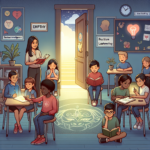
Building a Solid Foundation: The Essential Importance of Organizational Skills for Children with Learning Disabilities
Introduction
In today’s fast-paced educational landscape, the phrase "Building a Solid Foundation" resonates deeply, especially for children with learning disabilities. These children often face unique challenges in their academic and daily lives, leading to struggles with organization, time management, and practicality. However, cultivating strong organizational skills can significantly empower these young learners, providing them with the tools they need to navigate their educational journey. This article will explore the critical importance of organizational skills for children with learning disabilities, offering insights and strategies to help parents, educators, and caregivers create an environment conducive to success.
The Reality of Learning Disabilities
Understanding Learning Disabilities
Learning disabilities (LD) encompass a variety of disorders that affect how individuals receive, process, or communicate information. While terms like dyslexia and ADHD are commonly recognized, the world of learning disabilities includes a spectrum of challenges that can affect sensory processing, memory, and even social interactions.
Statistics Behind Learning Disabilities
According to the National Center for Learning Disabilities, approximately 1 in 5 students in the United States has a learning disability. This staggering statistic underscores the necessity of intervention, especially focusing on foundational skills that support learning.
| Learning Disability Type | Percentage of Students Affected |
|---|---|
| Dyslexia | 80% |
| ADHD | 5-10% |
| Dyscalculia | 3-7% |
| Nonverbal Learning Disabilities | 1-3% |
Why Organizational Skills Matter
The Link Between Organization and Learning
Building a solid foundation involves creating a structured environment. For children with learning disabilities, organizational skills are not merely beneficial; they are essential. Organizing tasks, materials, and time directly correlates with academic success and personal confidence.
- Reduced Anxiety: Children who are organized generally experience less anxiety. This leads to a more conducive learning environment where fear of the unknown is diminished.
- Increased Efficiency: When students have well-organized materials and schedules, they can find what they need quickly, allowing them to focus on learning rather than searching for resources.
- Enhanced Self-Esteem: Mastering organizational skills leads to a sense of accomplishment. A child who can track their homework deadlines is likely to feel more competent and ready to tackle challenges.
Strategies for Developing Organizational Skills
1. Visual Aids and Tools
Case Study: Visual Supports in a Classroom Setting
Many educators have seen profound benefits from using visual aids for children with LD. A case study at Sunnydale Elementary School examined how visual schedules improved organizational skills among fourth-grade students with various learning disabilities. Students using color-coded calendars and task lists exhibited a 40% increase in on-time assignment submissions compared to their peers.
Key Takeaway: Visual aids can bridge the organizational gap for many children. Examples include:
- Color-coded binders for each subject
- Magnetic whiteboards for daily tasks
- Visual timers to encourage time management
2. Checklists and Timers
Time Management Tools
Incorporating checklists and timers can significantly enhance a child’s ability to stay on track. A case study from Riverbend Academy detailed how using a simple checklist reduced homework time for a student with ADHD by 20%. By breaking tasks down into smaller, manageable steps and using timers to denote work periods, students stayed focused and organized.
| Tool | Purpose | Benefits |
|---|---|---|
| Checklists | Task organization | Reduces anxiety & enhances focus |
| Timers | Time management | Increases productivity |
3. Environment Assessment
Case Study: Organizing Learning Environments
A pivotal study at Hope Springs Therapy Center assessed organizational strategies by rearranging cluttered desks into organized workstations for children with LD. The results showed an increase in attention span and task completion rates by 30%, emphasizing a direct link between organized environments and enhanced focus.
Involving Parents and Caregivers
Home Support
The role of parents and caregivers in building these skills cannot be overstated. Steps to involve them include:
- Strategies for Routines: Setting regular study hours and clutter-free zones can significantly help children develop better organizational habits.
- Positive Reinforcement: Acknowledging organization successes, no matter how small, encourages continued effort.
Workshops and Resources
Educational workshops for parents showcasing effective organizing techniques can foster a supportive home environment, further building a solid foundation.
Creating a Supportive School Environment
Collaborating with Educators
Teachers play an integral role in assisting children with LD in honing their organizational skills:
- Custom Learning Plans: Establishing Individualized Education Plans (IEPs) can incorporate specific organizational goals tailored to each child’s needs.
- Technology Integration: Utilizing digital tools, like apps for organization and reminders, can be more appealing and effective for tech-savvy students.
Conclusion: Building a Foundation for the Future
Building a solid foundation is not just about academic success; it is about empowering children with invaluable life skills. By emphasizing the importance of organizational skills for children with learning disabilities, we can help them thrive both in the classroom and beyond. As parents, educators, and professionals, we must create a supportive environment that champions these skills, fostering resilience, independence, and confidence.
Motivation:
Consider this: every small step taken towards organization lays the groundwork for a flourishing future. Encourage your child, help them develop their organizational skills, and watch them thrive!
FAQs
1. What are organizational skills?
Organizational skills include a range of abilities such as time management, task prioritization, and maintaining order in physical and digital spaces. For children with learning disabilities, these skills are crucial for academic success.
2. How can I assess if my child needs help with organization?
Look for signs such as consistently forgetting assignments, difficulty following instructions, or a cluttered workspace. If these behaviors persist, it may be beneficial to seek advice from educational professionals.
3. What tools can I use to help my child get organized?
Consider using planners, checklists, color-coded storage solutions, and digital tools like reminder apps. Each of these can help a child maintain a clear overview of their tasks.
4. How can teachers support students with LD in developing organizational skills?
Teachers can provide structured routines, use visual aids, and develop individualized plans to meet students’ needs while fostering an environment that encourages organization.
5. What role do emotions play in organizational skills?
Emotional challenges stemming from a lack of organizational skills can lead to anxiety and decreased self-esteem. Helping children gain these skills can alleviate emotional stress, leading to improved mental health and academic performance.
By fostering a solid foundation of organizational skills, we pave the way for children with learning disabilities to not only succeed academically but to bloom into confident individuals equipped for life’s many challenges. Let’s commit to empowering every child—because their future is worth it.













